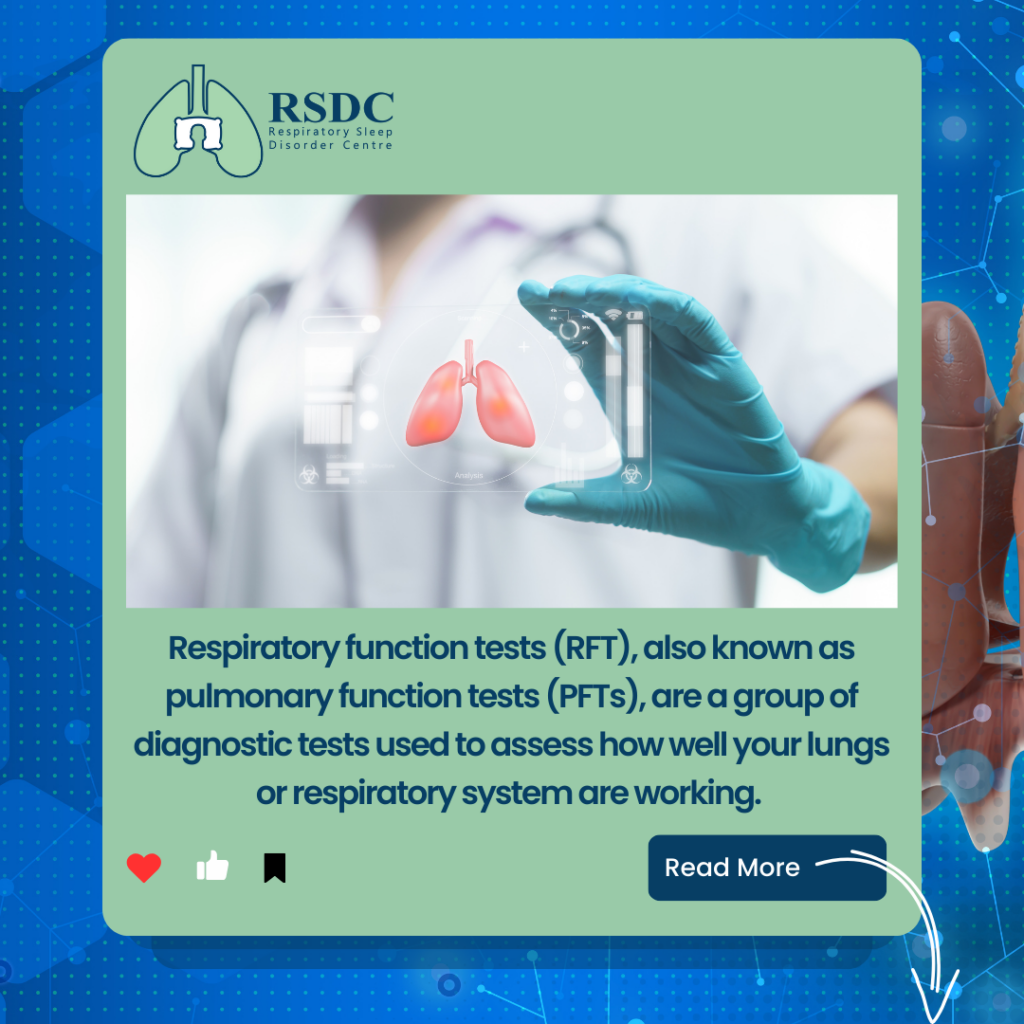Respiratory function tests (RFT), also known as pulmonary function tests (PFTs), are a group of diagnostic tests used to assess how well your lungs or respiratory system are working. These tests provide valuable information about your lung capacity, airflow, and overall respiratory health. Respiratory function tests are commonly used to diagnose and monitor various lung conditions, such as asthma, chronic obstructive pulmonary disease (COPD), occupational lung disease and interstitial lung disease, as well as to evaluate how well your lungs are functioning before surgery, as screening tool in some occupations with environmental exposures or as part of routine health check-ups.
Here are some key respiratory function tests and what they measure:
1. Spirometry: Spirometry is one of the most common respiratory function tests. It measures how much air you can inhale and exhale and how quickly you can do it. During spirometry, you’ll breathe into a device called a spirometer. The results include several important measurements:
– Forced Vital Capacity (FVC): This measures the maximum amount of air you can inhale forcefully after having had a big breath out.
– Forced Expiratory Volume in 1 second (FEV1): This measures the amount of air you can exhale in the first second of a forced breath out. The FEV1/FVC ratio is also calculated, which helps diagnose conditions like obstructive lung diseases.
– Peak Expiratory Flow (PEF): This is the maximum flow/speed at which you can exhale air and is often used to monitor asthma at home using simple hand held devices.
2. Lung Volume Measurement: These tests determine the total lung capacity and different lung volumes, such as residual volume and functional residual capacity. These measurements provide information about how well your lungs can expand and contract and also how much sir left in your lungs after a big breath out (residual volume).
3. Diffusion Capacity: This test measures how effectively carbon monoxide passes from the lungs into the bloodstream (it will then be a surrogate for how much oxygen can transfer from the lung into the blood). It helps evaluate conditions affecting the lung’s ability to exchange gases.
4. Lung Compliance: This test assesses the lung’s ability to expand and contract. Reduced lung compliance can be indicative of conditions like pulmonary fibrosis.
5. Mannitol Challenge Test: This test is used to diagnose asthma. It involves inhaling increasing concentrations of mannitol (a powder that drys the interior of the airways causing narrowing of the bronchial tubes in case they are diseased) to determine how sensitive your airways are to irritants.
6. Exercise Tests: These tests assess lung function during physical activity. The most common is the six-minute walk test, which measures how far you can walk in six minutes and evaluates your oxygen saturation and breathlessness.
7. Arterial Blood Gas (ABG) Test: This measures the levels of oxygen and carbon dioxide in your blood, providing information about your lung’s efficiency in exchanging gases.
8. And ultimately, the cardiopulmonary exercise test (CPET), or VO2Max test, that assess the function of the respiratory system, cardiovascular system and metabolic systems when they are performing together. It helps to identify how strong your body is as a whole and helps to see which of these many factors is the main reason for a deficiency. It’s use in athletes became outstanding as the single most reliable test to indicate how strong an athlete is and what body system needs more optimisation. In medical practice it helps to see what organ is the culprit for a deficiency or a symptom (usually for investigation of breathlessness). It also helps to risk stratify a moderate to high risk patient for a major surgery and confidently estimate risk of operation. We sometimes use it for medico legal reasons.
Lung function tests are typically performed by healthcare professionals, such as pulmonologists or respiratory physicians, in a specialized lab or clinic. The results help diagnose lung diseases, monitor disease progression, evaluate treatment effectiveness, and determine your overall lung health. If you have concerns about your respiratory health or are experiencing symptoms like shortness of breath, coughing, or wheezing, it’s important to discuss them with a healthcare provider who can recommend appropriate lung function tests and interpret the results.

